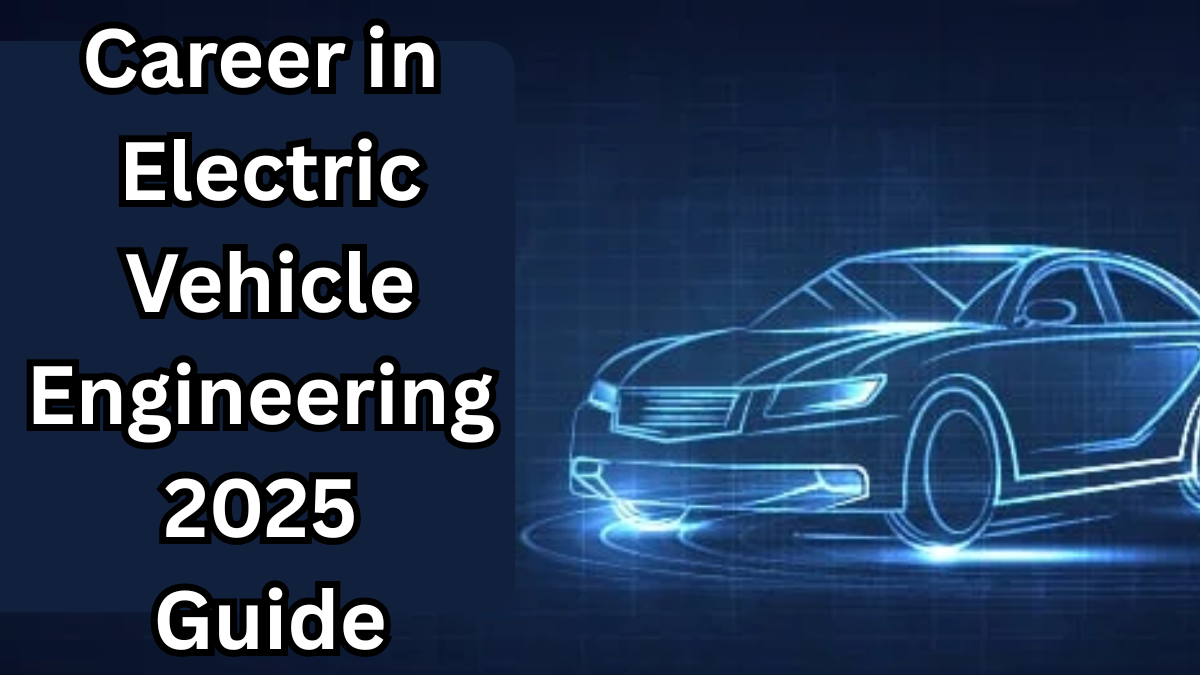As the world shifts towards sustainable transportation, a Career in EV engineering is not just a possibility—it’s a transformative journey. Whether you’re a recent graduate or a seasoned professional eager to switch lanes, understanding the scope, skills, courses and opportunities in Electric Vehicle (EV) Engineering is essential to navigating this booming sector.

Understanding the EV Revolution
Electric vehicles are at the forefront of the green energy revolution. With governments around the globe offering incentives and companies investing heavily in innovations, the market for EVs is set to expand exponentially in 2025 and beyond.
Key Highlights
-
Innovative Technologies: Integration of advanced battery management systems, AI for smart driving, and state-of-the-art power electronics
-
Environmental Impact: Reducing carbon emissions and promoting sustainable transportation
-
Economic Growth: New jobs and industries emerging from the EV ecosystem
Quick Fact: A solid foundation in mathematics, physics, and computer science is crucial when embarking on a Career in EV engineering.
The Scope of Opportunities
The growing EV market opens doors across various roles—from design and development to testing and project management. Here’s a snapshot of the career landscape:
Career Opportunities in EV Engineering
| Role | Key Responsibilities | Growth Potential |
|---|---|---|
| Battery Systems Engineer | Design and manage battery modules, ensure safety and efficiency | High – as battery tech evolves |
| Power Electronics Engineer | Develop motor controllers, optimize energy conversion systems | High – essential in EV integration |
| Software Developer | Create smart systems for navigation, diagnostics, and autonomous driving | High – with AI and IoT integration |
| R&D Specialist | Innovate new technologies in EV design and renewable integrations | Medium – focus on next-gen tech |
Each role requires a blend of technical expertise and innovative thinking. Familiarity with essential scope, skills, courses ensures that you remain competitive in the rapidly evolving industry.
Essential Skills for a Flourishing EV Career
To thrive in the dynamic field of Electric Vehicle Engineering, you need both technical and soft skills. Here’s a breakdown of the must-have skills:
Technical Skills
-
Battery Technology: Understanding lithium-ion, solid-state, and alternative battery systems
-
Electrical Systems Design: Proficiency in circuit design, embedded systems, and power electronics
-
Software Proficiency: Knowledge of programming languages (Python, C++, MATLAB), simulation tools, and data analysis
-
Renewable Energy Integration: Familiarity with systems that support sustainable energy sources
Soft Skills
-
Problem-Solving: Ability to think analytically and address complex engineering challenges
-
Team Collaboration: Effective communication with multidisciplinary teams
-
Project Management: Skills in managing timelines, budgets, and project milestones
Focusing on the scope, skills, courses required in the industry will position you as a strong candidate for a Career in EV engineering.
Courses and Certifications That Propel Your EV Career
Investing in the right educational path can significantly boost your profile in the EV sector. Consider these recommended courses and certifications:
-
Bachelor’s/Master’s Degree: In Electrical Engineering, Mechanical Engineering, or related fields
-
Specialized Certifications: Look into courses offered by professional bodies or online platforms specializing in EV technology
-
Workshops and Internships: Hands-on experience is invaluable. Participate in university projects or internship programs with established EV companies
Recommended Courses & Certifications
| Course/Certification | Provider | Focus Areas |
|---|---|---|
| EV Powertrain Design | Online Platforms | Battery systems, power electronics, CAD design |
| Battery Technology Certification | Professional Bodies | Battery management, safety protocols |
| Advanced Mechatronics | Universities/Colleges | Integration of software with mechanical systems |
| Autonomous Vehicle Systems | Tech Institutes | AI integration, sensor technology, control systems |
These courses not only enhance your technical background but also expand your practical understanding of electric vehicle systems.
Paving Your Path: Personal Experiences and Insights
Choosing a Career in EV engineering is not just about the technical know-how—it’s a passion-driven journey. Many engineers share that the satisfaction of seeing a concept turn into a reality on the roads is unparalleled.
Final Tips
-
Be Adaptable: The EV industry is evolving, so continuous learning is a must
-
Network Actively: Engage with industry professionals, attend conferences, and join EV forums
-
Stay Curious: Innovation is fueled by curiosity. Explore new technologies and challenge conventional thinking
FAQs
What are the primary responsibilities in EV engineering roles?
Responsibilities range from designing battery systems and power electronics to developing autonomous software and ensuring renewable energy integration.
Which courses are most beneficial for someone pursuing a career in EV engineering?
Key courses include EV powertrain design, battery technology certification, advanced mechatronics, and autonomous vehicle systems courses, as well as degrees in relevant engineering fields.
How do I acquire the necessary skills for success in this field?
Build a strong foundation in electrical engineering principles, improve your programming abilities, and gain practical experience through internships and hands-on projects. Emphasizing the scope, skills, courses required in the industry will improve your marketability.
What makes a career in EV engineering so promising in 2025?
With rising environmental concerns, government incentives, and technological advancements, there’s a strong demand for engineers who can innovate and drive the electric vehicle revolution forward, making it an exciting and secure career choice.
Click here to learn more